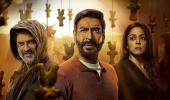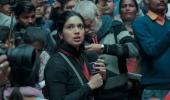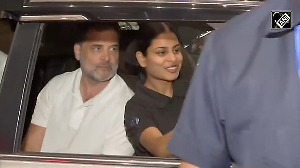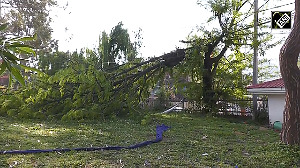'What scares me is the fact that there is so much content that people have content indigestion.'
'How do you entice people who have indigestion of content?'

Prasoon Joshi (53) began as a writer in his teens, did an MBA and then got into advertising. From Daag Ache Hain (Surf Excel) to Thanda Matlab Coca-Cola, his work shone with an Indianness that changed the way marketers spoke to consumers.
His second foray into writing, as a lyricist (Taare Zameen Par, Delhi 6, etc.), dialogue writer (Rang De Basanti) and then a scriptwriter (Bhaag Milkha Bhaag) has been successful. In 2017, he became the head of the Central Board for Film Certification (CBFC).
In November, Joshi forayed into theatre, with Rajadhiraaj: Love. Life. Leela, a musical depicting the journey of Shri Krishna. On a Google meet, Vanita Kohli-Khandekar spoke to Joshi about the play and other things.
How did the play come about?
The Dhanraj family (Dhanraj Nathwani, a director in Reliance New Energy, and his wife Bhoomi) are devotees.
They wanted to do something that will engage people and also share the message of Krishna.
I grew up in Uttarakhand where your exposure to spirituality is at a different level.
I see saints, scholars and meditators all the time.
The predisposal towards spirituality was very much there.

Do you think storytellers, creators and writers are under more pressure today because there is an oversupply of content and a more distracted audience?
That's a very good question. Art was consumed in a certain way. It had its own place in life. But somewhere, entertainment took over art.
Then entertainment had to face distraction. Algorithms are leading you into a certain, completely addictive zone.
When you go out of the house, you see children in the park, you see a person driving a rickshaw, you see a bird.
But when you come on the screen, the screen personalises so much for you.
Now, you are only bothered about the world that excites you neurologically. That neuro-world of yours is making for a cocooned existence.
Does that bother you as a writer?
At eight seconds, the human attention span is now less than goldfish's, which is nine seconds.
Since I started with writing 30-second commercials, I am used to being pithy and economical.
The form becoming shorter doesn't scare me. What scares me is the fact that there is so much content that people have content indigestion.
How do you entice people who have indigestion of content?

YouTube, Instagram et al have led to a point where everyone wants to be a writer, or a creator. What do you make of that?
(Poet Mirza) Ghalib used to say Tamashae ahlo karam dekhte hain (let us test the generosity of people).
The first challenge is that this is a satiated and overfed content generation. The second is that there are more storytellers than listeners.
That means there will be cacophony and a lot of noise. However, everybody has the right to tell their stories.
But from that chaos nectar will emerge.
Everybody is tasting a little bit of this and that, at some point people will feel the need to go into depth instead of just skimming through content.
How do you see the media and entertainment business today, given so much consolidation?
In the creative world, you see a lot of entrepreneurialism not just in India but in the US too. In our time, we were looking for the shelter of a big company.
Today, this is the last thing they want.
On the one hand, consolidation is happening in terms of capabilities, tools, and data, but on the other consolidation in talent is not happening because talent is feeling very empowered.
Their dream is to set up something on their own. That is a big shift in the creative industry.

Did your perspective of the business change when you became CBFC chairman in 2017?
Hundred per cent. When a film-maker makes a film, there is a certain honesty.
Film-makers and creative people are not doing it to harm anyone, they are just expressing their point of view. The way other people are seeing it never occurred to the maker.
And, at that point, the only thing which can help is a dialogue.
From the day I joined, I said 'main vivaad nahin samvaad karoonga (I don't want to have a dispute, I want to have a discussion)'.
Has samvaad become a part of CBFC's process now?
Yes. I have N number of examples where things have been voluntarily changed by film-makers after realising through discussion that this never occurred to them, or the officers have felt that actually what we were thinking going by the rule book, the point of view was different from that.
In Hindi, we say Swantehe sukhae, it is self-expression. But films are not being made for one's own self-expression or pleasure.
It is also a commercial venture, so, the audience is equally important. You have to make sure that the people who are watching your content are making an informed choice.














 © 2025
© 2025